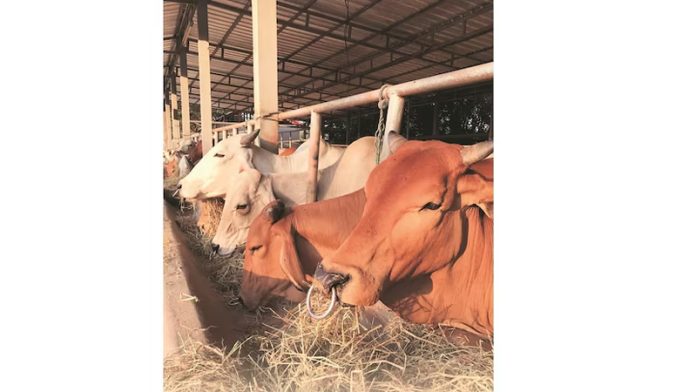NEW DELHI, Oct 25: Union minister Rajiv Ranjan Singh on Friday launched 21st Livestock Census which will be conducted till February next year at a cost of Rs 200 crore and said the availability of precise data will help the government frame policies for ensuring health security of animals and achieve higher growth in the sector.
Singh, who is Minister of Fisheries, Animal Husbandry and Dairying, also launched a USD 25 million ‘Pandemic Fund Project’ to strengthen animal health security in India for pandemic preparedness and response.
Addressing an event, the minister said that this livestock census should be undertaken with full honesty and sincerity. He asked his ministry officials to monitor this census operation regularly.
“The livestock census operation will be conducted with a budget of Rs 200 crore. The cost will be entirely funded by the central government,” he told reporters. The report will come next year.
The 21st Livestock Census, to be conducted during October 2024-February 2025 period, will capture data on 219 indigenous breeds of 16 species.
At all-India level, around 1 lakh field officials who are mostly veterinarians or para-veterinarians will be involved in the enumeration process.
“This will help the government in framing right policies for the growth of this sector and animal health security. It will help in controlling animal disease and breed improvement,” Singh said.
The minister pointed out that India has not been able to export milk and other dairy products in a big way, despite being the world’s largest milk producer.
The minister announced that the government will be able to control Foot and Mouth Disease (FMD) and Brucellosis diseases by 2025 and will eradicate them completely by 2030.
Singh said the Pandemic Fund Project is a USD 25 million initiative funded by the G20 Pandemic Fund.
Amitabh Kant, Sherpa to the G20, said, “Today we have moved a step forward with securing a grant from the pandemic fund. Animal health security is critical as it is directly connected with human health. Many zoonotics diseases originate in animal. So, strengthening animal health directly contributes to preventing human pandemic”.
He noted that animal diseases can severely affect the livestock industry, which is a key source of income for millions of Indian farmers.
The ministry said that the 21st census will collect data on 15 species of livestock– Cattle, Buffalo, Mithun, Yak, Sheep, Goat, Pig, Camel, Horse, Ponies, Mule, Donkey, Dog, Rabbit and Elephant.
Other than livestock, the headcount of poultry birds — Fowl, Duck, Turkey, Geese, Quail, Gini Fowl, Ostrich and Emu — will also be taken from each household/ household enterprises/ non-households/ institution.
These species are recognised by ICAR-National Bureau of Animal Genetic Resources (NBAGR).
The livestock census is a crucial exercise that is being conducted every five years since 1919, serving as the backbone for policy formulation and the implementation of various programmes in the animal husbandry sector.
The census involves a comprehensive door-to-door survey that captures detailed data on domesticated animals and birds across the nation.
Till date, 20 livestock censuses have been conducted and the last census was held in 2019.
The latest census leverages mobile technology for data collection and transmission. This is expected to enhance the accuracy and efficiency of data collection across all villages and urban wards in the country.
The 21st Livestock Census will cover over 30 crore households across all states and Union Territories, including nomadic communities and pastoralists, ensuring that the diversity of India’s livestock practices is captured. The census will focus on critical areas such as gender roles in livestock rearing, breed management, animal health and productivity.
The event was attended by Ministers of State for Fisheries, Animal Husbandry and Dairying S P Singh Baghel and George Kurian.
Baghel lauded the efforts made by the department in preparing for the census and ensuring its smooth rollout across all states and UTs.
“The Livestock Census is more than just a headcount; it’s a crucial exercise that feeds into our national strategies for food security, poverty alleviation and rural development,” he said.
Kurian highlighted the sector’s contribution to the GDP and employment generation, particularly in rural areas.
“Livestock provides livelihoods to over 2.1 crore people and is integral to India’s agricultural economy. The data gathered through the 21st Livestock Census will help us identify areas where interventions are needed to uplift rural livelihoods and improve animal health,” he added. (PTI)


